A few weeks ago Intel released a new collection of 9th-technology H-series processors for gaming and excessive-performance laptops, meaning we'll get to peer a number of the ones inside the latest models as we revisit laptops to look how those new chips stack up.
Intel’s remaining couple of product traces have been a piece complicated, with a couple of code-names and architectures cut up across one-of-a-kind series. Current U-series chips for ultraportable laptops are still branded as 8th-gen and are codenamed Whiskey Lake, even as newer H-series chips get a bump up to ninth-gen and form part of Coffee Lake Refresh, similar to contemporary laptop CPUs.
- HP ProBook 6360b Notebook Review
- Lenovo Yoga 13 Review
- Razer Blade 14" Gaming Laptop Hands On
- Asus C90S Laptop Barebones review
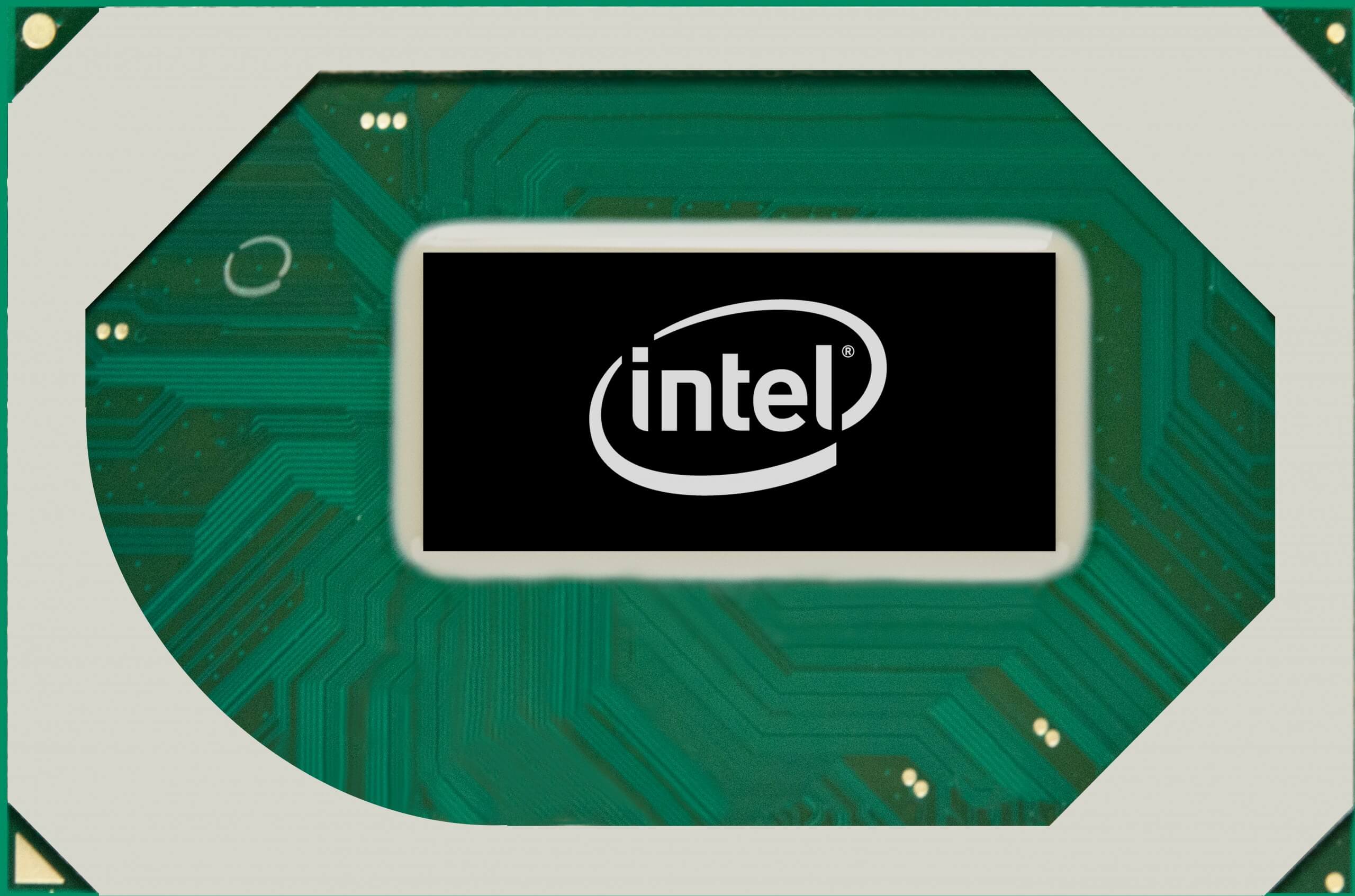
Where the enhancements are coming depends on the CPU. For the Core i5 models, we’re getting very modest clock pace jumps. The 9300H is just 100 MHz better for base and increase clock, while the 9400H doesn’t even get a base clock growth, simply an additional a hundred MHz boom to the boost. L3 cache of 8MB remains the equal.
For the Core i7s we do get a cache growth from 9MB to 12MB and the 9750H has acquired the most important clock leap relative to the popular 8750H: it goes from a 2.2 GHz base and four.1 GHz enhance, to a 2.6 GHz base and four.5 GHz increase. So that’s a four hundred MHz increase throughout the board. The 9850H is more modest once more, without a base clock benefit and 300 MHz greater at the improve.
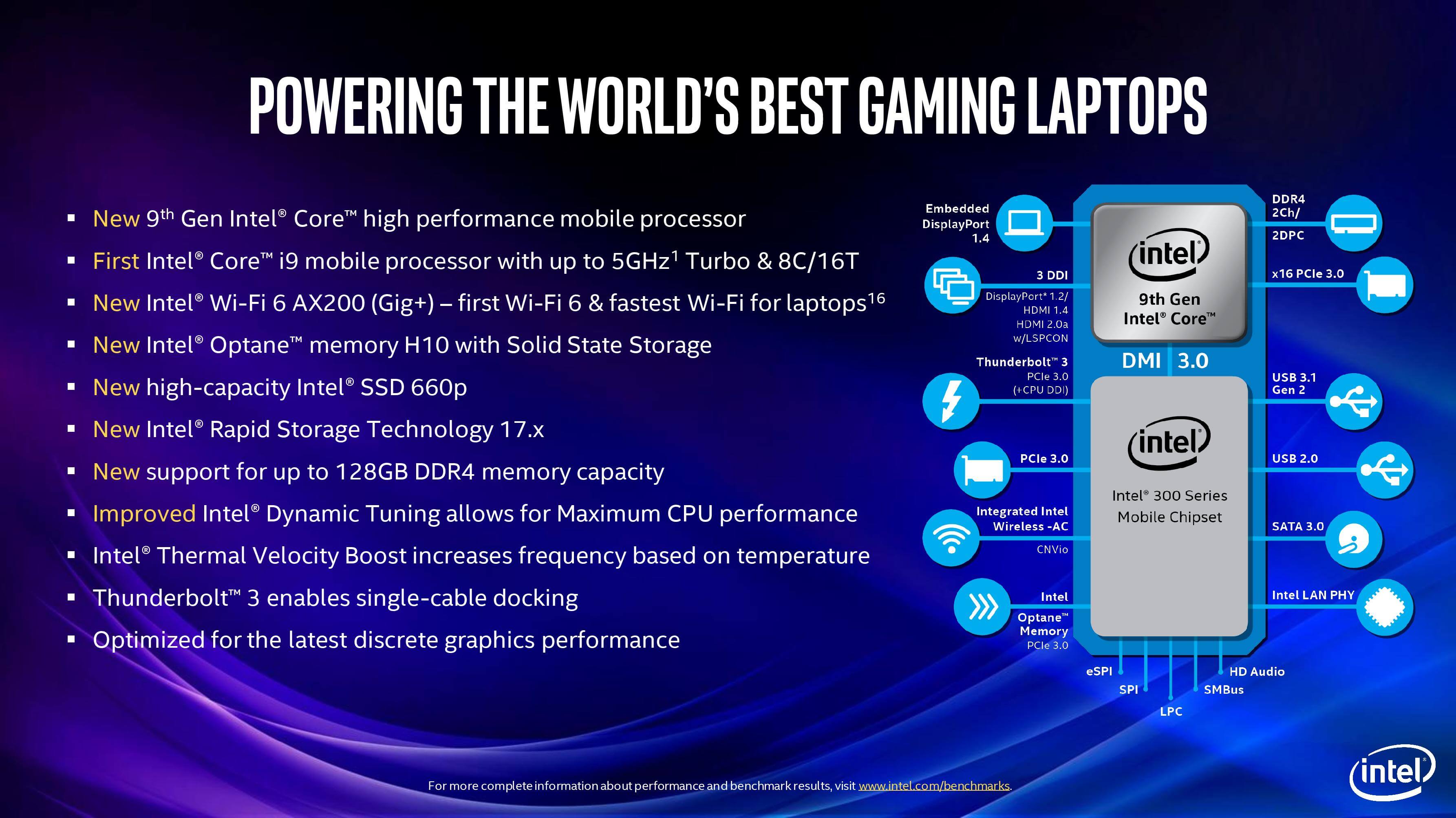
Given the 8750H and now the 9750H are the most commonly used H-collection processors, mainly for almost all of gaming notebooks, we do find these specification breakdowns interesting. The 9750H sits a lot in the direction of the 9850H than the corresponding eighth-gen parts, and the 9750H is the best chip to get 10-20% percent clock increases. It looks like Intel has focused profits for this CPU mainly, knowing how popular it is, to ensure that at the least a few ninth-gen parts deliver actual performance increases.
With that stated, whilst the 9750H has muscled in on the 9850H’s territory, the 9850H profits a brand new function that’s particular to that processor, which Intel calls Partial Overclocking. This just means OEMs can installation to a 5.0 GHz rapid frequency in the event that they want to, depending on the tool and its cooling capabilities.
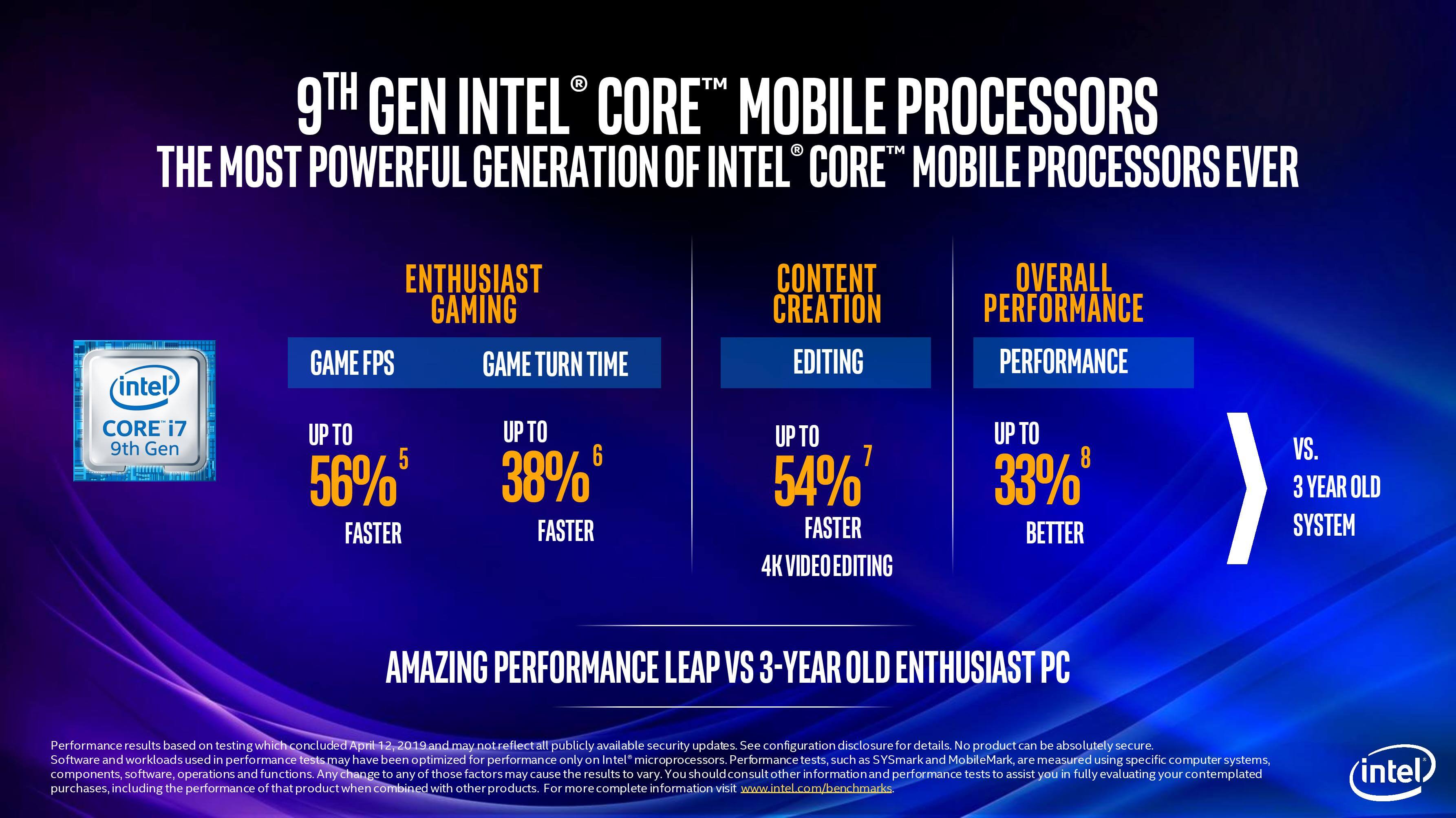
And then of route are the new Core i9 fashions, which deliver 8 cores and sixteen threads to laptops to fit top Core i9 desktop fashions. The i9-9980HK can even attain 5.zero GHz, like the 9900K, inside a 45W TDP. These eight-middle Core i9s replace the unmarried 8th-gen Core i9, which changed into nonetheless a six center component with better clocks.
While it's miles interesting to look 8-center CPUs come to laptops in a claimed 45W TDP, Intel nation they're focused on “Musclebooks” with those chips. Intel simply made up Musclebooks as a product category but basically they discuss with those extremely good chunky beastly gaming laptops and equally hefty workstations models that include a large fee sticker. This leaves the Core i9 as greater of a gap CPU in place of an 8-core pc CPU reachable to all.
Intel Coffee Lake H-Series Core i7 Line-up

The recognition of this Laptopis at the Core i7-9750H which is the brand new mainstream H-series laptop CPU that will be visible in lots of gaming laptops shifting ahead. Specifically we need to test out the distinction among the 9750H and the 8750H with the intention to be a drop-in alternative or upgrade for same pc models. With the staggered releases between Nvidia at the GPU facet, and Intel at the CPU facet, many laptops are available with the equal GPU inside however a desire between the 9750H or 8750H.
We can assume this isn’t quite just like the leap from the Core i7-7700HQ to the i7-8750H wherein we went from four cores to six cores, so performance profits should be greater modest.
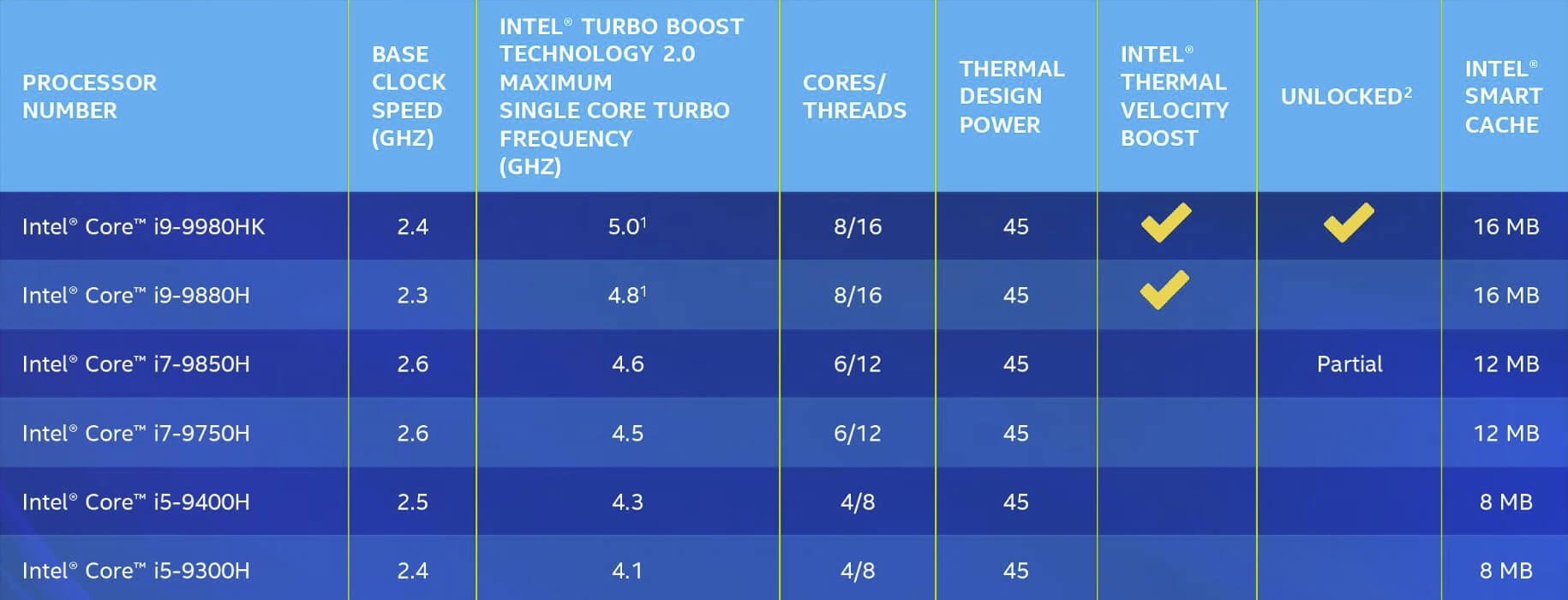
A final phrase at the spec the front earlier than digging into a few performance stuff, Intel does listing the maximum Turbo clock for the 9750H at 4.5 GHz, despite the fact that this best applies to a single core. With two cores lively it drops to 4.4 GHz, then it follows down in 100 MHz increments for each additional energetic core, right down to 4.0 GHz for six cores.
This differs again from the 8750H, which allows four.1 GHz on up to two cores, four.zero GHz on as much as four cores, then three.nine GHz on six cores. So when the 9750H is completely applied on six cores, its maximum rapid clock does grow to be simplest one hundred MHz better than 8750H. Something to hold in thoughts and shows that an amazing portion of Intel’s enhancements have targeted single or low center be counted utilization.
Performance
For checking out the Core i7-9750H we acquired laptops from Gigabyte and MSI. The Gigabyte version is the Aorus 15, which also functions a new 240 Hz display but is a bit on the loud facet with a relatively traumatic cooler noise profile. The 2nd gadget is the MSI GE75 Raider, a larger 17-inch laptop. Both occupy that form of mid-size, mid-tier option inside the market, so it’s first-class and clean not to test a cooling-limiting slender and light the primary time round.
Both laptops come ready with GeForce RTX 2070 pc GPUs, the full computer variation not Max-Q. We’re additionally getting 16GB of dual-channel DDR4-2666 that is the maximum speed the 9750H supports -- no alternate with those new CPUs in the direction of supporting higher frequencies. Both have 1080p displays as well and fast NVMe SSDs.
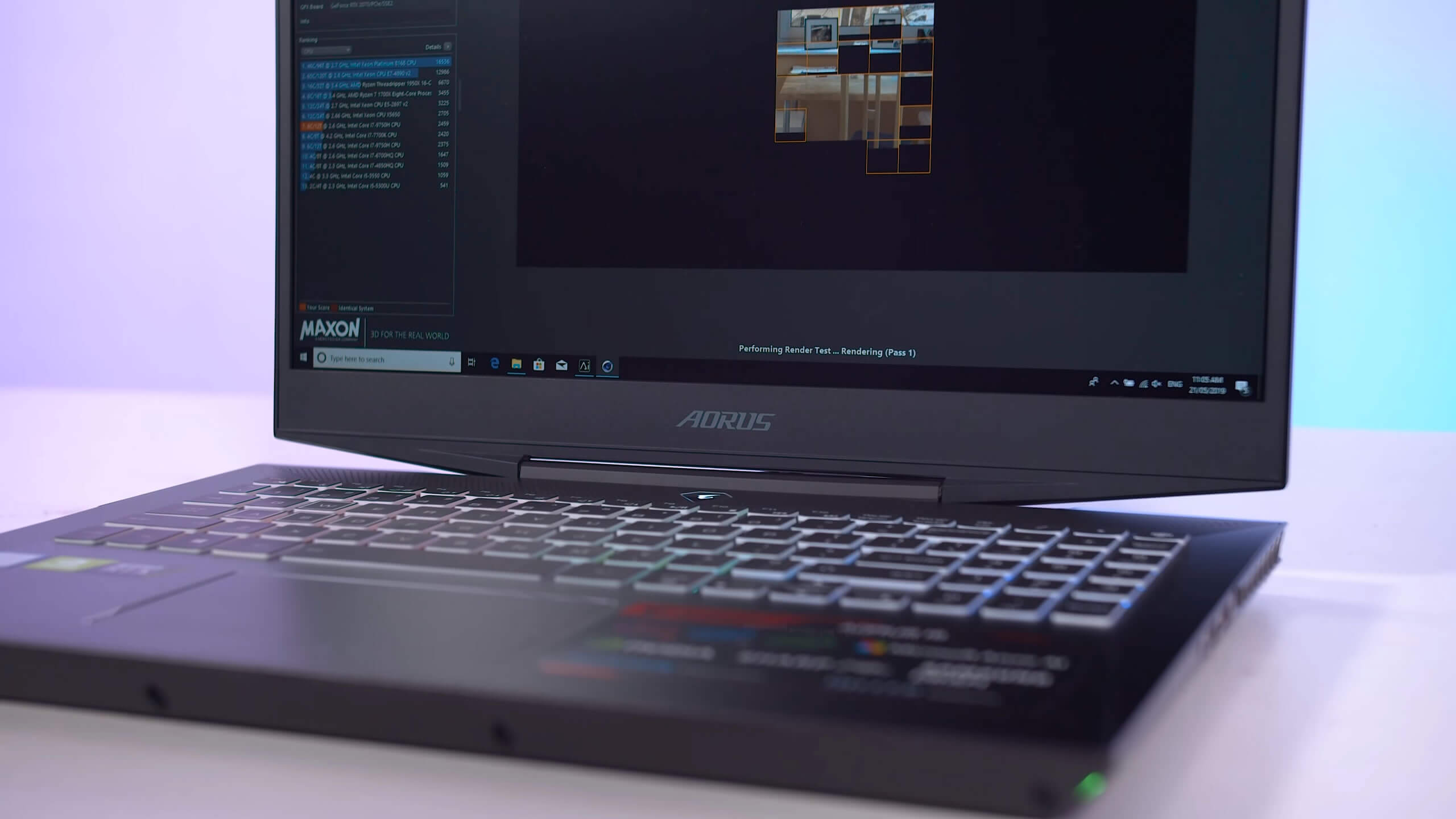
The first factor we need to explore, and that is important for the rest of the performance segment, are power limits and clock speeds. Laptops are a pretty restricted form factor so although Intel offers a CPU the choice to run at as much as four.zero GHz throughout six cores, strength limits will nearly continually save you the CPU from virtually hitting the ones clocks in long time workloads, in contrast to absolutely unleashed computer structures.
What we’ve visible over the previous couple of years with Intel’s H-collection merchandise is that OEMs tend to disregard the actual TDP rankings in prefer of higher PL1 and PL2 limits, which pushes up clock speeds. With quad-middle Core i7-7700HQ laptops we usually saw PL1, or the longer term turbo restriction, sitting around 45W. With the i7-8750H, in many laptops that jumped up to 52W or thereabouts, that is appreciably higher than the actual 45W TDP, with closing dates removed.
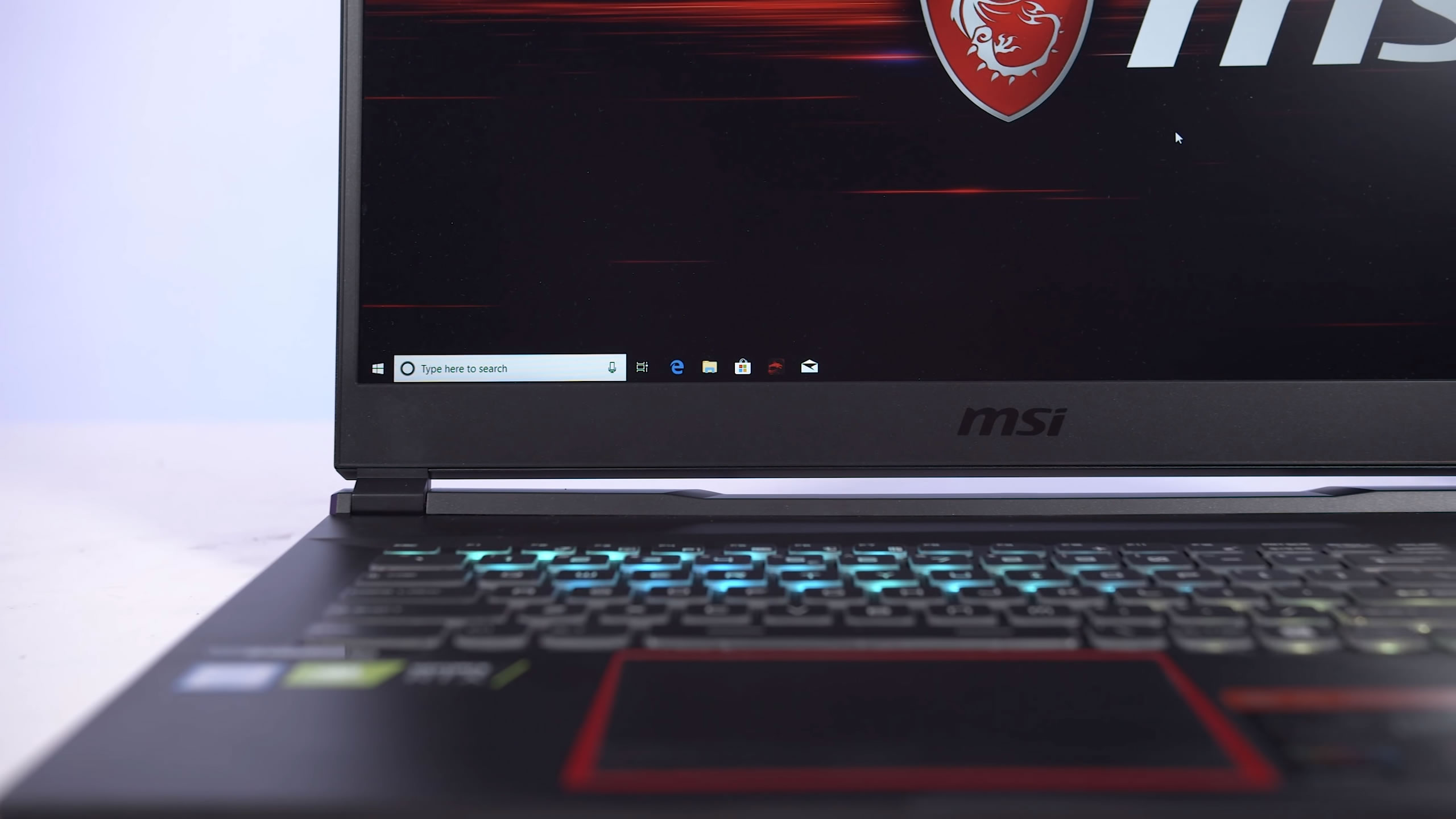
We're no longer going to get into the complete TDP argument about whether that is in-spec or out of spec behaviour however on the stop of the day, OEMs felt they may manage the new six-core CPUs in their designs with a better strength limit, and to achieve better performance they allowed it. And with the i7-9750H we’re once more seeing around a 52W PL2 restriction, despite the fact that in the MSI version it’s a bit higher at around 54W.
PL2 limits have also multiplied a bit to allow the better brief time period faster frequencies. The i7-9750H check laptops have been configured to 80W, compared to 70W for the 8750H. But the real tale here is that PL1 limit: given the 9750H is basically the identical architecture, built at the identical method node with the same center configuration, we are able to’t clearly assume higher real international clock speeds within the same electricity restriction.
Cinebench R20 MT CPU Clock Speed Average

And that’s basically what we get in terms of actual clock speeds. The Core i7-8750H inside the Gigabyte Aero 15 X9 sits round three.1 GHz long-time period in a Cinebench R20 run, after to begin with hitting three.three GHz. The newer Core i7-9750H within the Gigabyte Aorus 15 sits round 3.1 GHz long time in a Cinebench R20 run, after to start with hitting three.three GHz. In different words, same behaviour.

So while we study Cinebench R20 performance, lo and behold each structures perform roughly the same within the multi-threaded take a look at. The MSI version does clock barely better and therefore plays slightly better, but now not significantly so. The easy reality is it takes greater than honestly growing clock speeds on paper to gain a actual-world performance development while every different thing of the CPU remains the same, consisting of its power barriers. And that is what we’ll see throughout those overall performance charts.
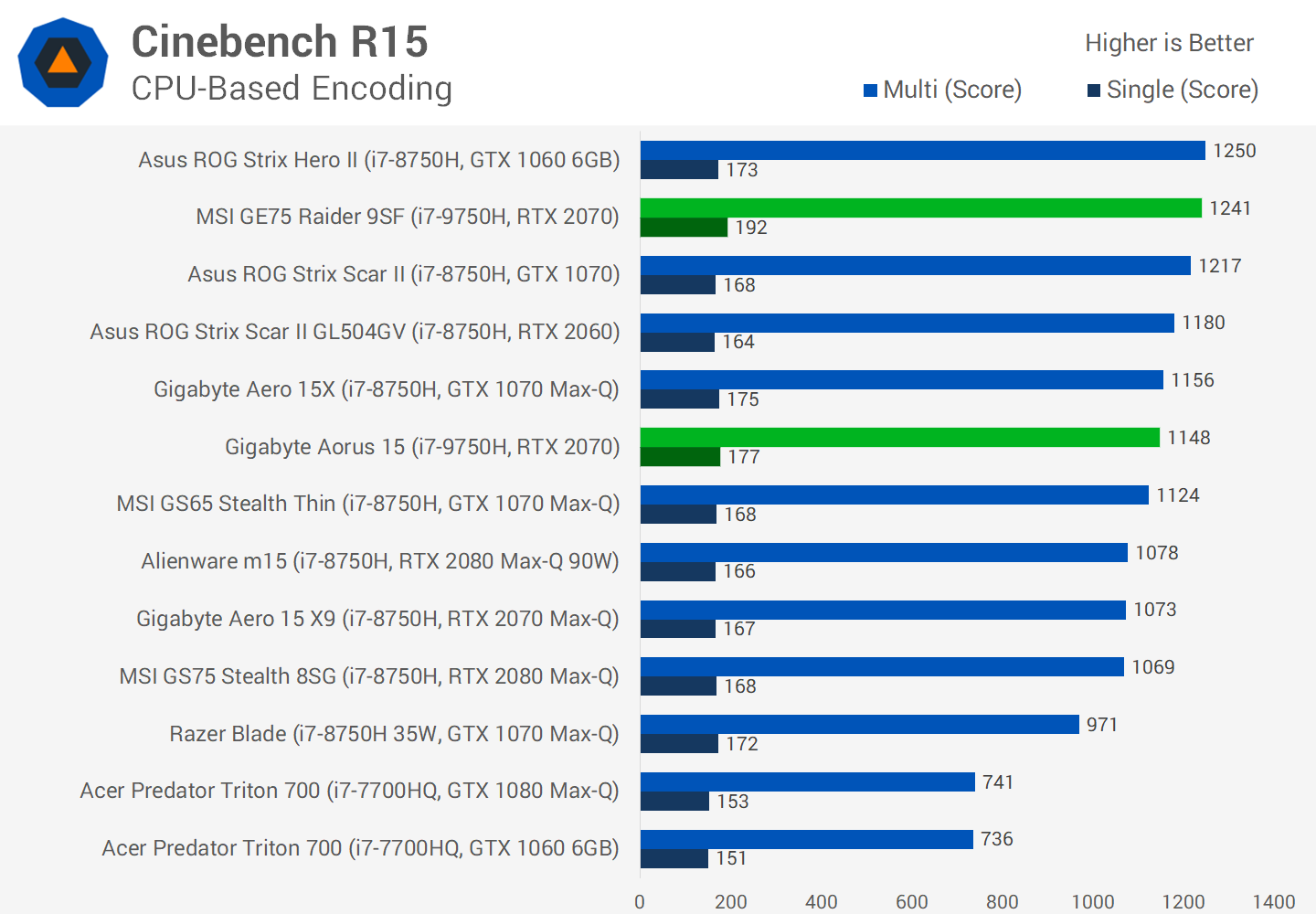
Here’s any other one for Cinebench R15 with a much wider variety of structures in the charts. The MSI model plays properly in the multi-threaded check but it’s now not the quickest system, and gets overwhelmed through an Asus laptop with the i7-8750H. The Gigabyte model is extra middle of the percent, it’s no longer slow, however it’s not anything unique.
It is a little more favourable to the MSI model inside the single-threaded check wherein it clocks in thirteen% faster than the common Core i7-8750H end result. That’s where the ones higher unmarried-center clocks coming to play.
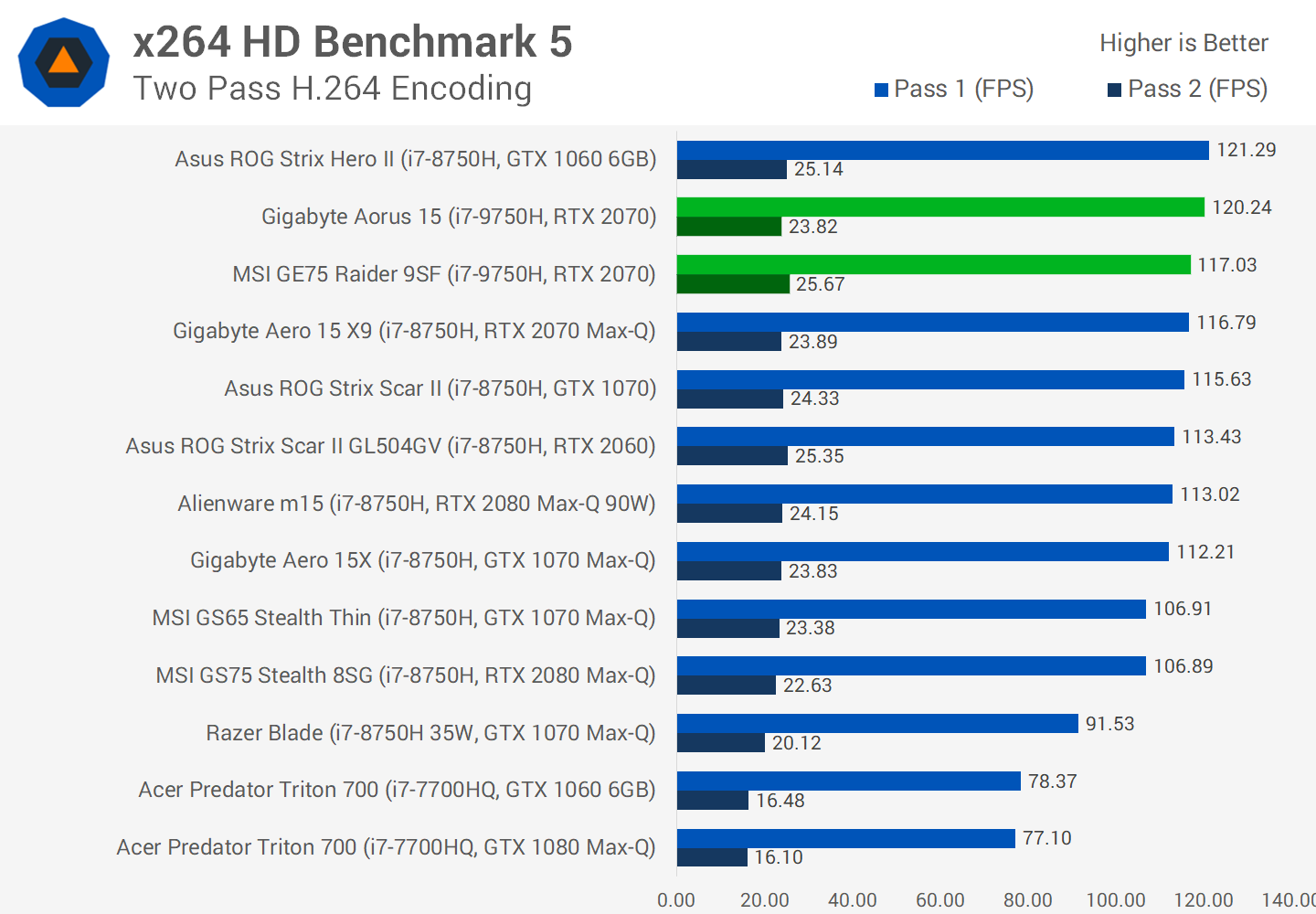
In x264 encoding, the Core i7-9750H laptops carry out properly in bypass 1, but the Gigabyte machine falls back to the % inside the 2d skip. The MSI model is outright quickest however very barely beforehand of the well-acting Asus models, to the music of one percentage. Not exactly the improve a few could want.
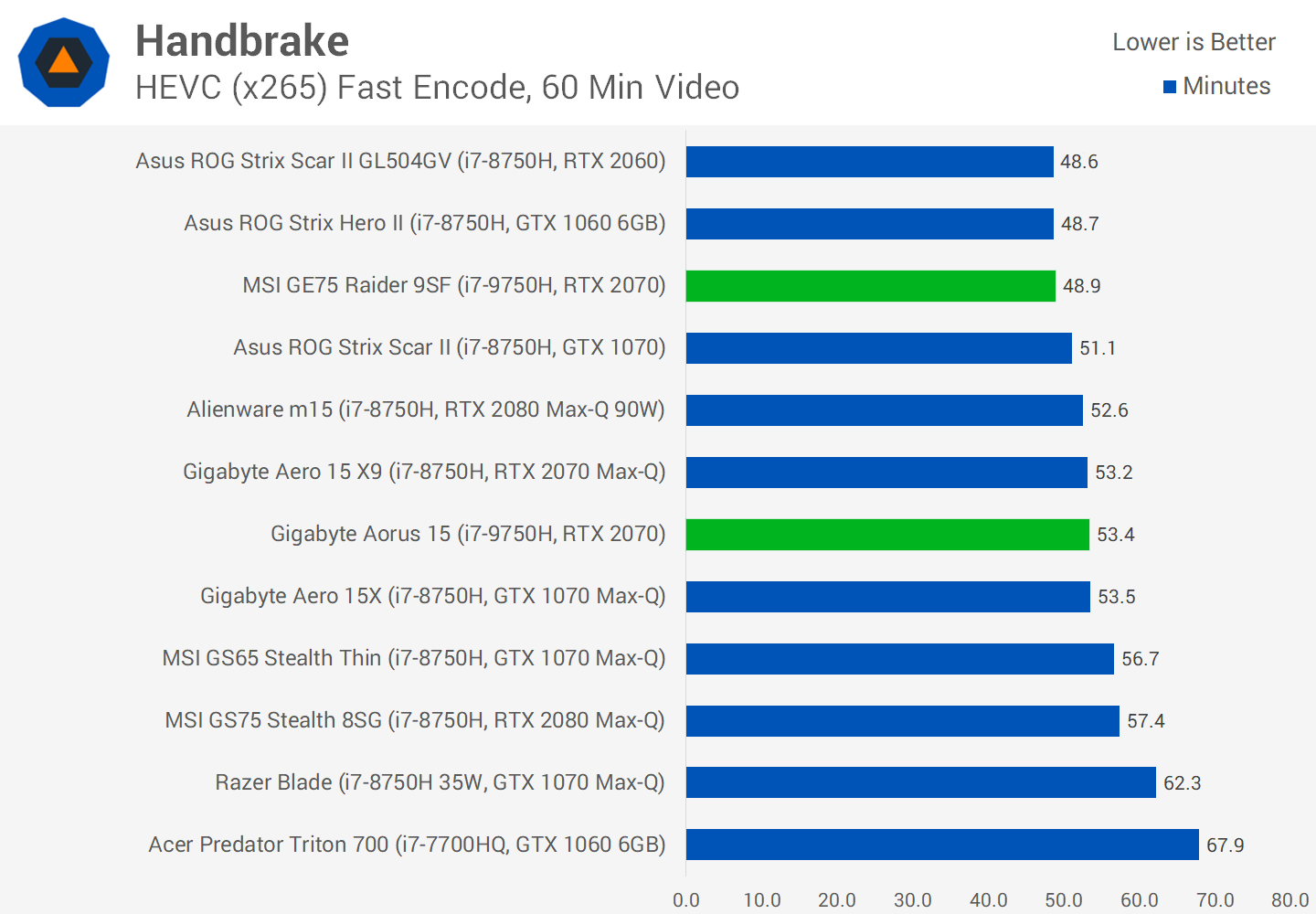
Handbrake is comparable. This is a long take a look at that falls nearly entirely below the PL1 limit and once more, while the MSI model plays well, it’s now not the outright fastest gadget and receives overwhelmed by means of Asus models. The Aorus 15 is no faster than Gigabyte’s Aero 15 X9.

Our Premiere benchmark with Lumetri outcomes, whilst it does utilize the GPU particularly, becomes CPU restricted when you are jogging a GTX 1060 or so. So once more we’re in a state of affairs where the MSI model is not the quickest however performs properly, even as the Gigabyte model is no distinctive to most Core i7-8750H laptops.
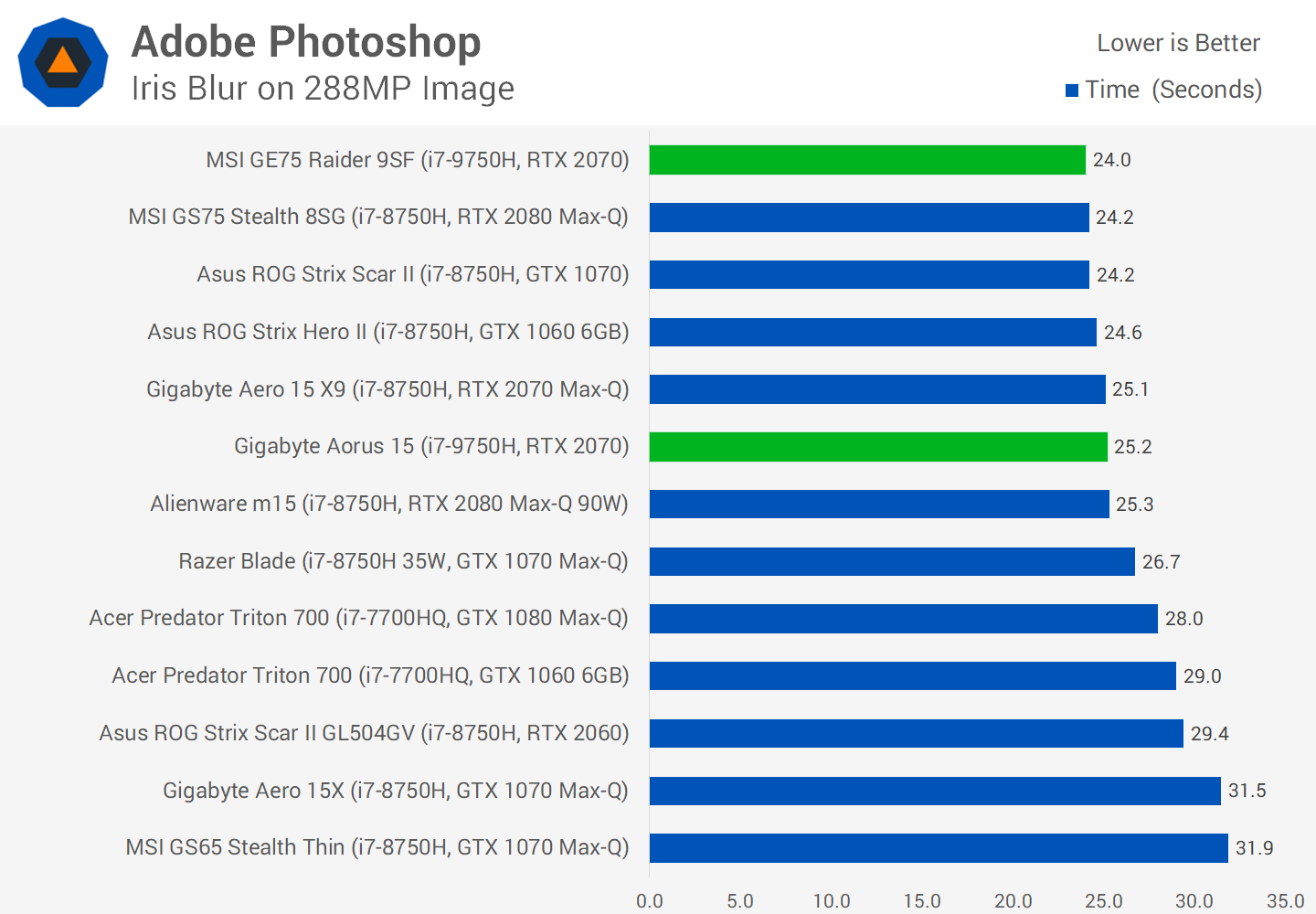
You’ve in all likelihood visible a chart like this the previous few times: Adobe Photoshop with the CPU-restrained Iris Blur impact is a superb showing for the 9750H but isn’t in the end faster than the 8750H.
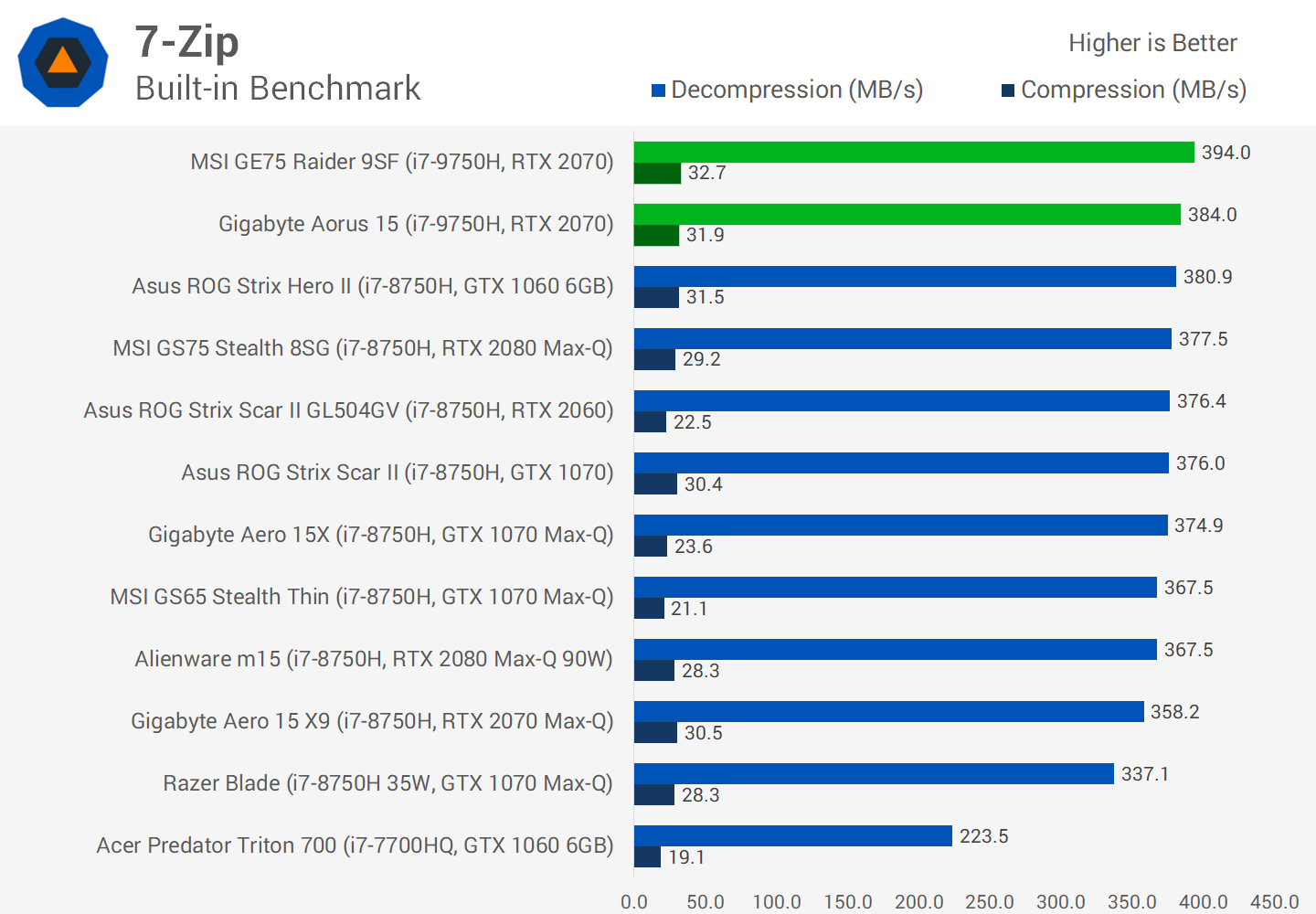
Finally we see some thing slightly one of a kind in 7-Zip. The two Core i7-9750H laptops sit down atop the charts, but best simply: the Gigabyte version is 1% quicker than the fastest 8750H computer, even as the MSI version fares a touch higher, slotting in 4% quicker. This will hardly ever sway every person to a 9th-gen gadget.
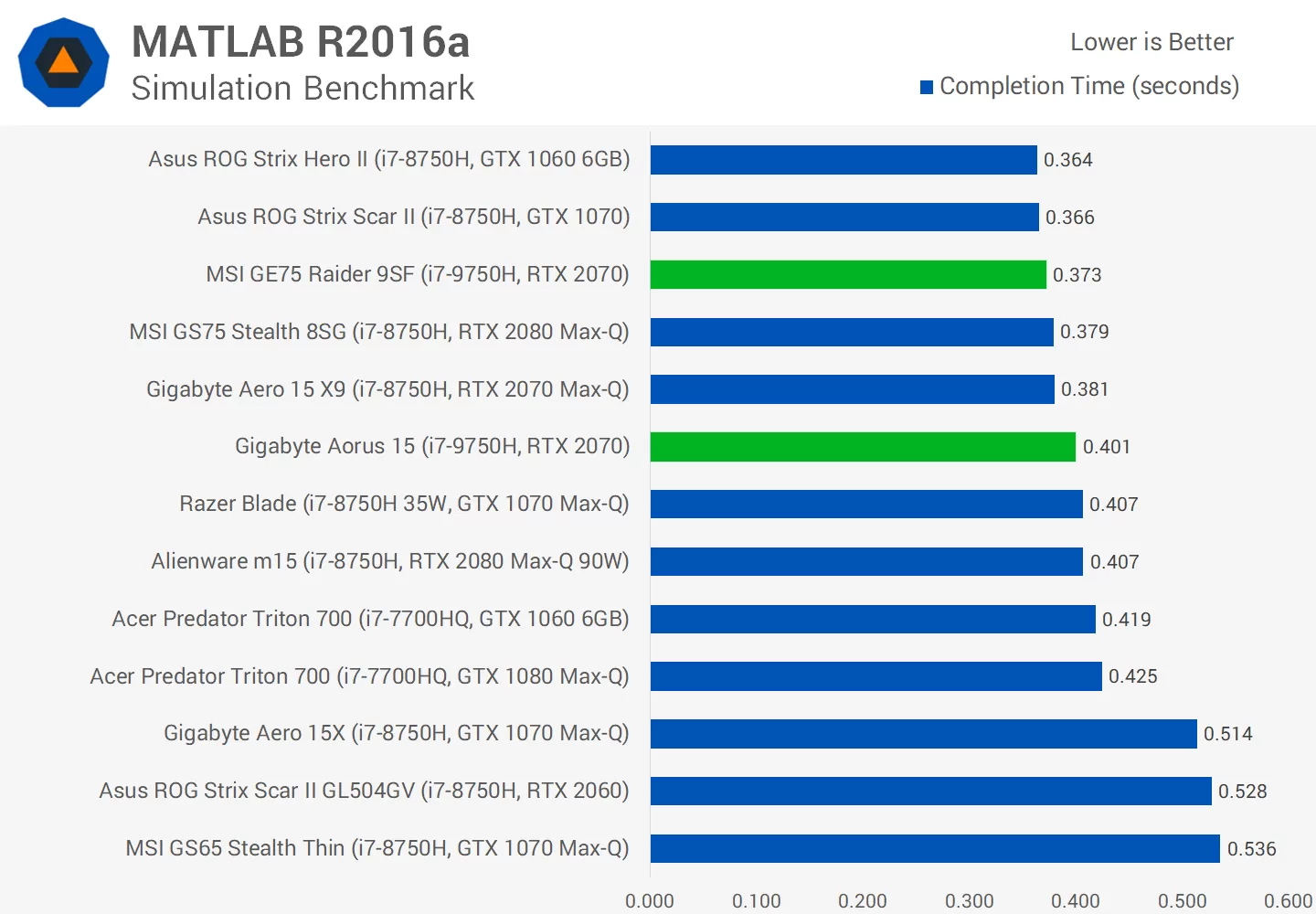
MATLAB doesn’t enjoy the Core i7-9750H over the Core i7-8750H. Same overall performance depending on which structures you without delay compare.
Performance Summary
Here are some final charts to summarize this whole scenario properly. Here we've got the Gigabyte Aorus 15 with its Core i7-9750H pitted against the average Core i7-8750H result. We’re seeing a tiny 2.eight percentage performance gain on average, and that evaporates to a performance deficit when in comparison to one of the quickest Core i7-8750H laptops we’ve examined (Asus Strix Scar II).
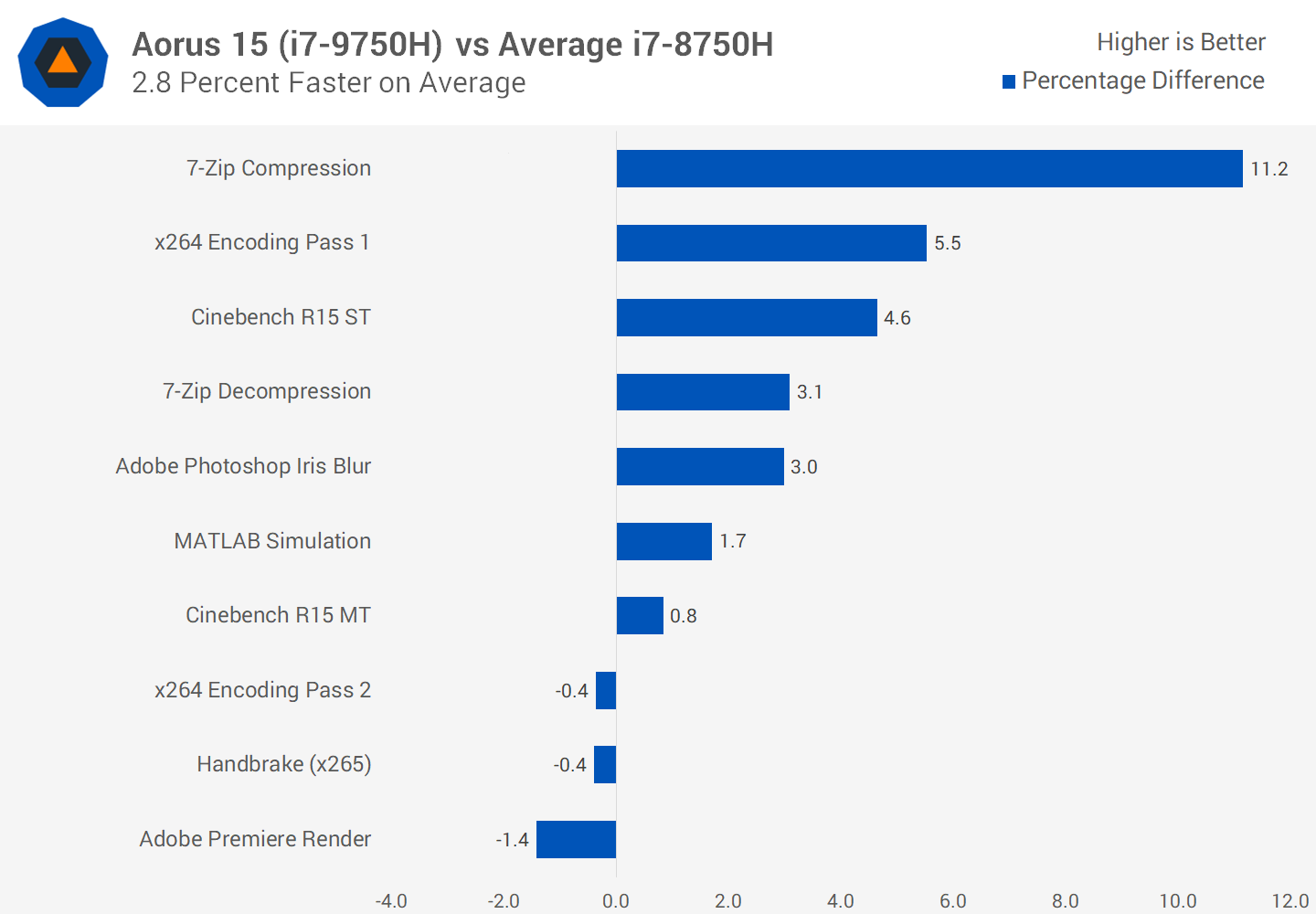
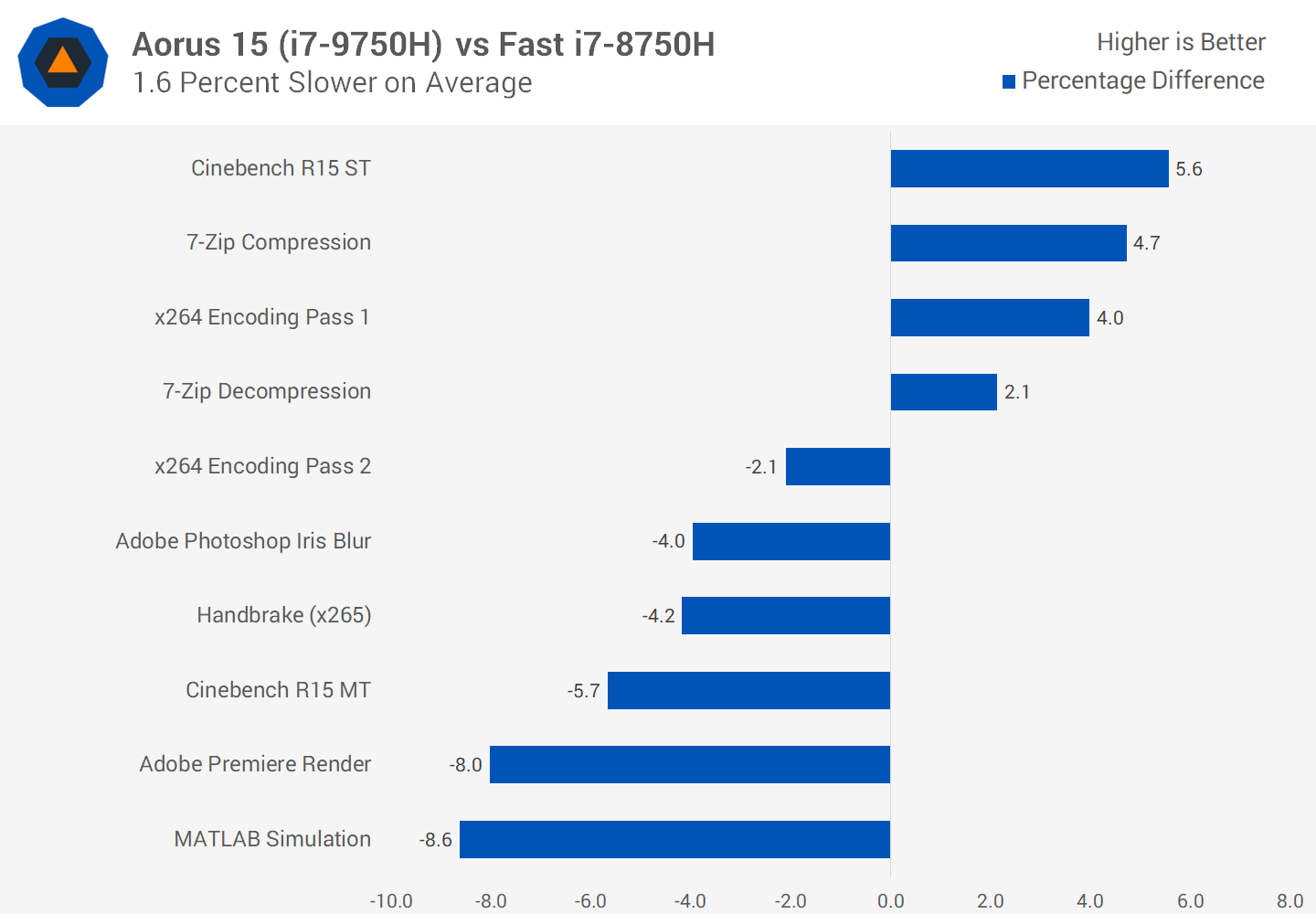
The consequences are a touch greater favorable for the MSI version: eight percentage quicker than the common Core i7-8750H laptop is a sturdy end result and there are mainly top outcomes in Cinebench single-thread and 7-Zip compression. But evaluate that to a quick Core i7-8750H version (will depend on a laptop's specific configuration and cooling profile) and that margin is cut to just four percent.
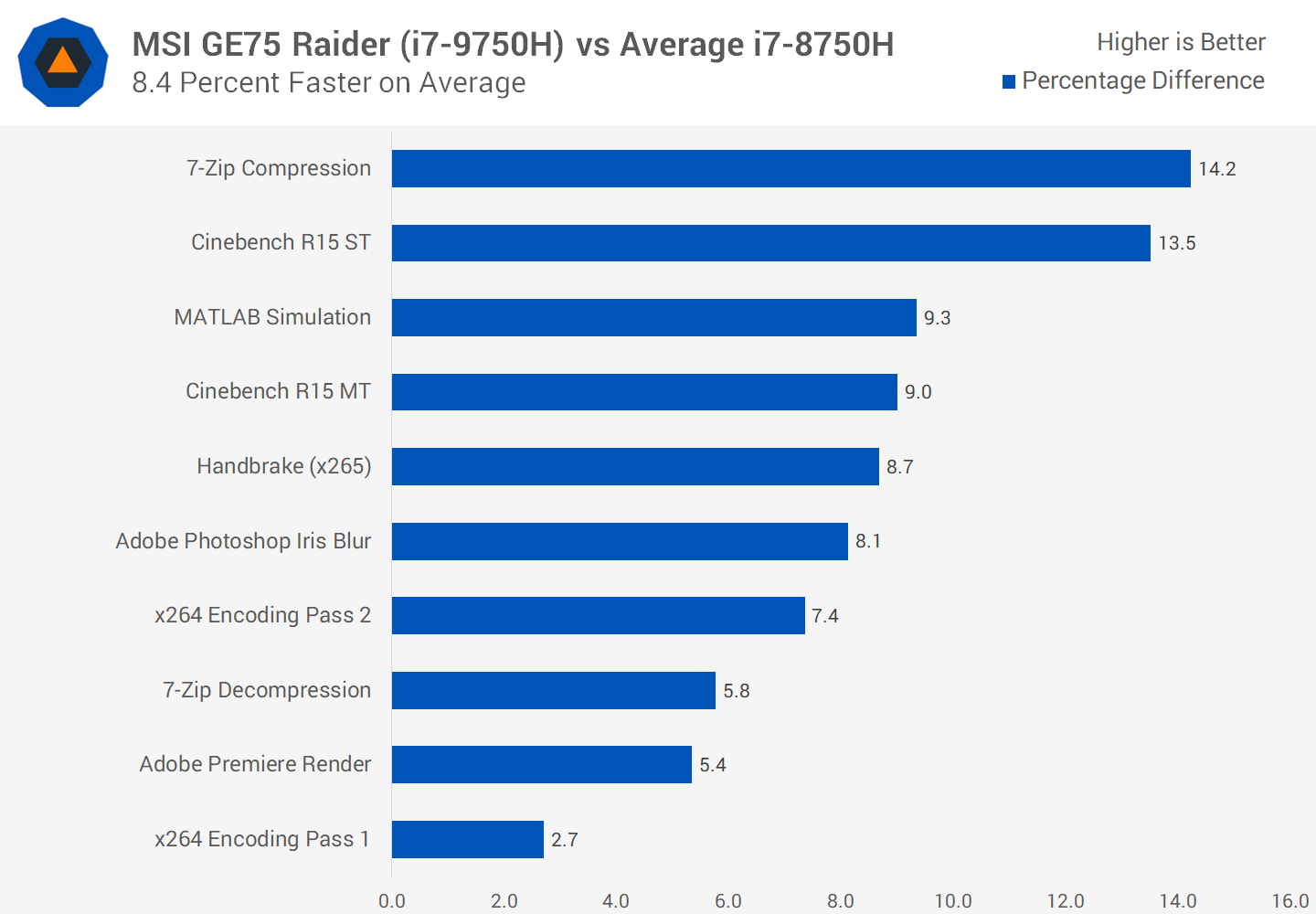
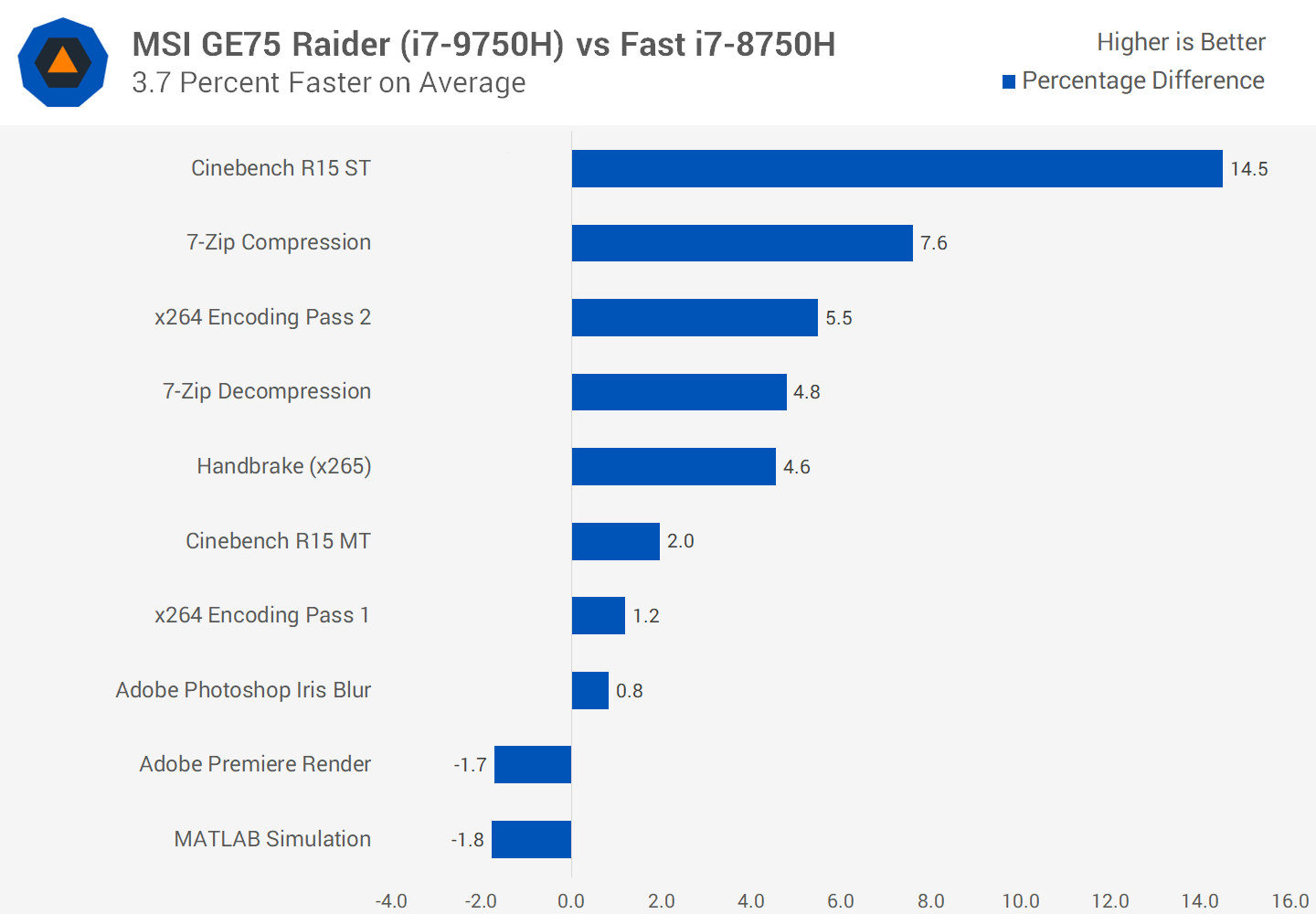
Wrap Up
Something we haven’t mentioned is how the 9750H stacks up against the quad-middle Core i7-7700HQ, a common upgrade direction for plenty buyers coming from previous era gaming laptops. As the Core i7-9750H may be very much like the 8750H, we’re looking at as much as 50% gains or higher in some workloads, with a median in this option of forty two percentage.
For gaming, unluckily we didn't have a 8750H computer also ready with a RTX 2070 to make a proper apples-to-apples contrast, however our impression up to now is that like with the productivity workloads, there haven’t been any progress in performance while you are CPU restrained. CPU-heavy games like Hitman 2 aren’t faster than expected and the 9750H doesn’t have tremendously higher clock behaviour than the 8750H in video games. At quality we expect a ~five% improvement depending on the computer model, but there are numerous different variables at stake here. Having, say, only single-channel memory will make a bigger effect than having the 8750H over the 9750H.
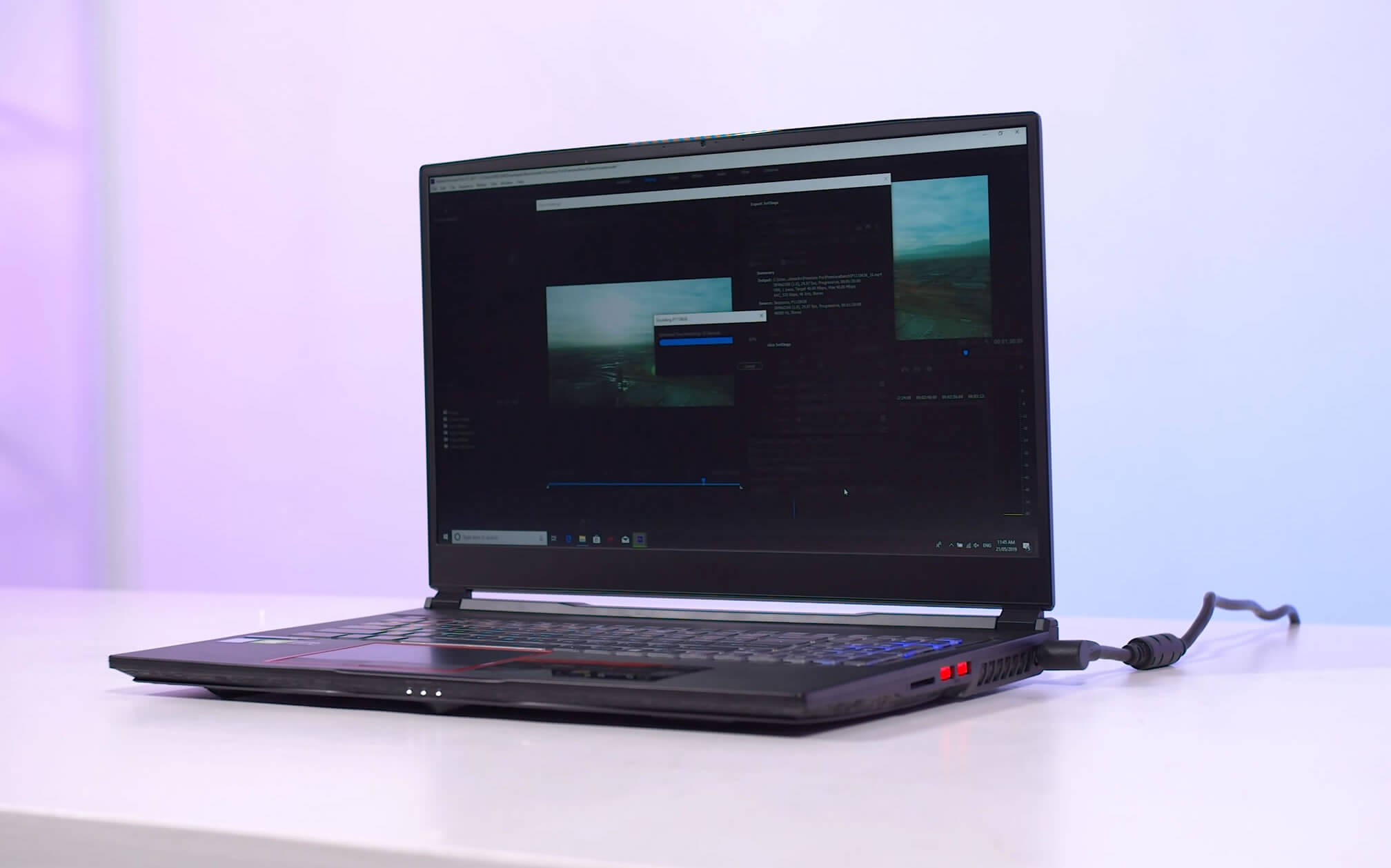
Looking on the spec sheet, we cannot act amazed by way of this final results. The foundations for the brand new Core i7-9750H are equal to the Core i7-8750H, however with Intel showing up to 400 MHz will increase in base clocks and increase clocks – which admittedly drop to as low as 100 MHz while looking at the entire clock table – we have been looking ahead to a touch more. And we suppose numerous shoppers is probably waiting for extra as nicely, consequently the point of this evaluate. The reality is we didn't discover the Core i7-9750H to be definitively faster than the Core i7-8750H in actual global implementations. The two CPUs are about the same, and at fine the 9750H is slightly faster in case you get a favorable healthy-up among laptops. But it'd additionally be barely slower, as evidenced with the aid of our benchmarks.

Bottom line, there’s now not plenty difference between the 8750H and 9750H. So if an 8750H system with otherwise equal specifications is cheaper than a brand new 9750H system, you need to pick the preceding-gen version. You may want to argue it’s a chunk of a useless product and we might were high-quality persevering with on with the identical overall performance from the trusty vintage 8750H.
But that doesn't make it a terrible product. If you find a Core i7-9750H laptop at an excellent rate it must be as proper as the standard 8750H gadget and will absolutely offer a large overall performance soar over seventh-gen laptops or older. But it’s now not some thing you’d improve to from an eighth-gen Core i7 and also you truly shouldn’t trust it’s faster just primarily based at the spec sheet. At least with the manner OEMs enforce those processors these days.
- Intel Core i7-9750H laptops on Amazon
- Gigabyte Aorus 15 on Amazon
- MSI GE75 Raider on Amazon
- Intel Core i7-8750H laptops on Amazon
0 Response to "Intel Core i7-9750H vs i7-8750H Review"
Post a Comment